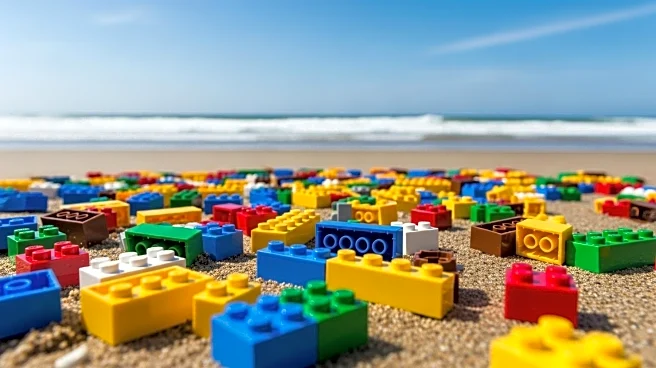What is the story about?
What's Happening?
In 1997, a cargo ship named Tokio Express was hit by a rogue wave off the coast of Cornwall, resulting in nearly five million pieces of Lego being scattered across the ocean. Tracey Williams, who first discovered a piece of this lost Lego while on holiday in Bigbury Bay, has since turned this discovery into a global mission to track down the pieces and raise awareness about plastic pollution. The Lego pieces, many of which are sea-themed, continue to wash ashore, attracting treasure hunters from around the world, including the U.S., Italy, and Australia. Williams has created a Facebook page, Lego Lost at Sea, to document sightings and connect with other beachcombers. Her efforts have also contributed to scientific research on the longevity of plastic in marine environments.
Why It's Important?
The ongoing discovery of these Lego pieces highlights the persistent issue of plastic pollution in the oceans. The story has captured international attention, serving as an engaging entry point for discussions about environmental conservation. The Lego pieces, which include items like octopuses and life jackets, ironically reflect the marine environment they now inhabit. Williams' initiative not only raises awareness but also contributes valuable data to scientific studies on oceanic plastic drift and degradation. This case underscores the long-term environmental impact of plastic waste and the importance of global efforts to address pollution.
What's Next?
Williams plans to continue her work by publishing more scientific papers based on the data collected from the Lego findings. She is also working on a book for children to further educate and engage younger audiences on the topic of plastic pollution. As more pieces are discovered, the project may continue to inspire environmental activism and contribute to policy discussions on reducing plastic waste. The ongoing interest in the Lego spill could lead to increased public support for initiatives aimed at cleaning up the oceans and preventing future pollution.
Beyond the Headlines
The Lego spill serves as a unique case study in the broader context of environmental ethics and corporate responsibility. It raises questions about the accountability of companies in preventing and addressing environmental disasters. The story also highlights the role of citizen science and community engagement in tackling global issues. By turning a seemingly trivial incident into a platform for education and activism, Williams' project exemplifies how individual actions can contribute to larger societal changes.















